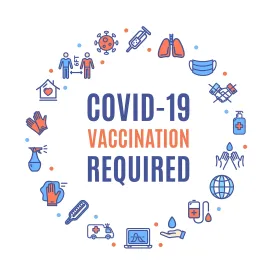On November 4, 2021, the Occupational Health and Safety Administration (“OSHA”) released its COVID–19 Emergency Temporary Standard (the “ETS”). Pursuant to the ETS, employers with 100 or more employees must develop, implement and enforce a COVID-19 mandatory vaccination or weekly testing policy and follow certain specific rules for unvaccinated employees and those who test positive. The following frequently asked questions (and answers) highlight some of the most significant matters covered by the ETS.
ETS Coverage
Which employers are covered by the ETS?
Employers with 100 or more employees which are not covered by the federal contractor or healthcare vaccination rule at a particular worksite are covered by the ETS. The 100-employee threshold covers all employees, including part-time employees. It is based upon the total number of employees employed by the employer at all locations combined. The ETS also includes specific rules for considering workers assigned to the employer by staffing companies, seasonal and temporary employees, and multi-employer worksites.
Do I need to comply with the ETS if I am already covered by the Safer Federal Workforce Task Force COVID-19 Workplace Safety: Guidance for Federal Contractors and Subcontractors (the “Federal Contractor Mandate”)?
No, not at the same worksite. In other words, if an employer’s physical worksite is covered by the terms of the Federal Contractor Mandate, the ETS does not apply at that site. However, if a federal contractor or subcontractor maintains a worksite that is not covered by the Federal Contractor Mandate (even if it has other sites that are), it must comply with the ETS at that worksite if the employer meets the coverage requirements under the ETS.
Even if I am a covered employer, are there specific employees to whom the ETS vaccination and testing requirements will not apply?
The vaccination and testing requirements in the ETS do not apply to employees working exclusively outdoors, or to employees working remotely and who are not reporting to any workplace where other individuals, including coworkers, clients or customers, are present.
Deadlines
By what date must employers comply with the ETS?
On or before January 4, 2022, the employees of a covered employer must be either “fully vaccinated” or must submit to COVID-19 testing at least every seven (7) days during those periods when the employee is reporting at least once every seven (7) days to a workplace where others, such as coworkers, clients or customers, are present. In other words, those employees who are not fully vaccinated or who decline to show proof of vaccination status by January 4, 2022, will need to commence weekly testing effective January 4, 2022, at least for any weeks in which the employee is not working entirely remotely. For purposes of the ETS, an employee is considered “fully vaccinated” two weeks after receiving a single dose vaccine such as Johnson & Johnson, or two weeks after receiving the second dose of a two-dose vaccine such as Pfizer or Moderna.
On or before December 5, 2021, employers must be in compliance with all other ETS requirements, including, among other mandates, mandatory face coverings for non-vaccinated employees, paid time off for vaccinations and reporting positive COVID-19 cases.
Vaccination Requirements
Is an employer required to obtain proof of vaccination from employees?
Yes. Acceptable proof includes physical or digital copies of the employee’s COVID-19 vaccination card; medical or immunization records from a health care provider or pharmacy or a public health, state or tribal immunization information system; or other official documentation confirming receipt of the vaccine. Employees who have lost, or cannot otherwise provide, acceptable proof of vaccination may sign and date a written attestation confirming their fully vaccinated status, subject to criminal penalties for falsification.
Must an employer maintain records of vaccination?
Yes. An employer must maintain vaccination records (hard copy or digital) and a roster of each employee’s vaccination status. The records and roster must be maintained in a confidential manner, consistent with OSHA regulations and guidance from the Equal Employment Opportunity Commission.
Must an employer pay for time an employee spends receiving the vaccine?
Yes. An employer must provide a non-exempt employee with up to four (4) hours of paid time, at the employee’s regular rate of pay, for the purposes of vaccination (four hours for each required dose depending on vaccine type), if the employee receives the vaccine during the employee’s working hours. Under the ETS, an employer does not have to provide paid time to get the vaccine if the employee chooses to get the vaccine during non-work hours. Significantly, an employer cannot require an employee to use pre-existing accrued paid time off or sick pay to cover this four-hour period.
Must an employer pay for time an employee takes off of work to recover from vaccine side effects?
Yes. The employer must provide reasonable paid time off for an employee to recover from side effects of the vaccine. If an employee has available accrued sick leave, or paid time off that can be used for various reasons including sick time, the employer may require the employee to use that time to cover any time off of work needed to recover from side effects of the COVID-19 vaccine. An employer that has policies which distinguish between sick time and vacation time, however, cannot require an employee to use vacation time to recover from COVID-19 vaccine side effects.
Employers are also prohibited from requiring an employee to borrow against or incur “negative” sick time or other paid time off to cover such recovery time. In cases where the employee has no paid time or sick pay available, the employer must provide reasonable paid time off to the employee to recover from vaccine symptoms. The ETS guidance indicates that OSHA considers up to two (2) days to be a “reasonable” amount of time.
Please note that state or local law may require that employers provide employees with benefits greater than those provided by the ETS.
Must employers require that employees receive a COVID-19 booster?
No. Booster shots are not included in the ETS definition of “fully vaccinated,” and therefore, employers do not need to require receipt of a COVID-19 booster, track receipt or keep related records.
Testing Requirements
What type of test is required?
The ETS includes a broad scope of permissible tests that can be used to meet the COVID testing requirements. A diagnostic test approved by the FDA to detect current infections, commonly referred to as a “viral” test, is generally permissible. This definition covers the vast majority of commercially available PCR and “rapid” tests, and includes both nucleic acid amplification tests and antigen tests. Antibody tests are not acceptable under any circumstances.
All approved tests must be administered in accordance with the FDA-authorized instructions. Tests that are both self-administered and self-read by the employee are not permissible under any circumstances. Approved antigen tests can be self-administered but not self-read by the employee. Over the counter and approved self-administered tests can be used through the use of a proctored test that is supervised by an authorized telehealth provider or proctored by the employer.
Are covered employers required to pay for the cost of testing under the ETS?
No, unless otherwise required under applicable law. The ETS itself does not require employers to pay for testing. However, the ETS seems to recognize that certain state wage and hour laws may require employers to pay for testing as a “medical examination” or as a business expense. For example, employers in California and Illinois (and in other states) are cautioned that testing expenses may be reimbursable authorized business expenses under applicable wage statutes. Unionized employers may also be required to pay the cost of required COVID testing under the parties’ collective bargaining agreement. Employers should consult counsel related to the state and local laws where they operate or to evaluate obligations under any existing collective bargaining agreements.
Are covered employers required to pay for time spent testing?
The ETS itself does not address this question. However, time spent by non-exempt employees taking a required COVID test under the ETS is likely compensable under existing FLSA guidance and under the state wage and hour laws in certain states. (Note: several states have issued express guidance on COVID testing as compensable time.) Employers should consult counsel to determine whether such time is compensable based on the facts and circumstances of the testing program used by the employer.
Notice to Employees
Are employers required to provide specific information regarding the ETS to employees?
Yes. Employers must provide 1) information about the requirements of the ETS and workplace policies and procedures established to implement the ETS, 2) the CDC document “Key Things to Know About COVID-19 Vaccines,”[1] 3) information about OSHA protections against retaliation and discrimination and 4) information about laws that provide for criminal penalties for knowingly supplying false statements or documentation.
Are employers required to have a mandatory vaccination policy?
Yes. The policy must include specific information regarding vaccination requirements, exclusions from the policy (including accommodations for medical conditions or sincerely held religious beliefs), how an employee’s vaccination status will be determined and how related information will be collected, paid time off for vaccination purposes, notification of positive COVID-19 tests and removal of positive employees from the workplace, information to be provided to employees regarding the ETS and how it will be provided and disciplinary action for employees who fail to comply.
OSHA also encourages employers to include information regarding the policy’s effective date, who is covered, deadlines and procedures for compliance and enforcement.
Union Issues
Do we have to bargain with our union workforce before implementing the requirements of the ETS?
Employers generally do not need to bargain over the decision to implement prevailing federal law, but likely will have an obligation to bargain over the effects of implementation, depending on the language of the collective bargaining agreement. Such bargaining may include issues such as what constitutes a reasonable period of time for vaccination and sick leave after vaccination, whether paid time off for vaccination should be in addition to paid time off already provided and whether the employer must pay for testing or time spent testing.
Is the ETS subject to legal challenges?
Legal challenges have already begun. However, until an injunction is issued by a court, the ETS will be enforceable and employers should be prepared to comply with its requirements.
[1] https://www.cdc.gov/coronavirus/2019-ncov/vaccines/keythingstoknow.html





 />i
/>i

